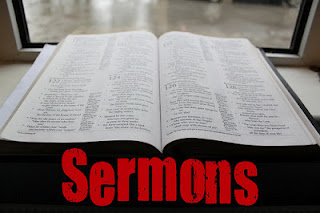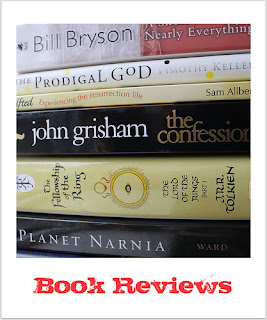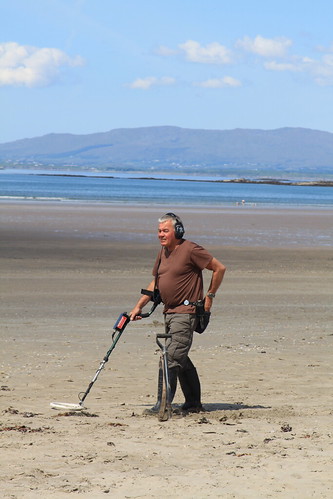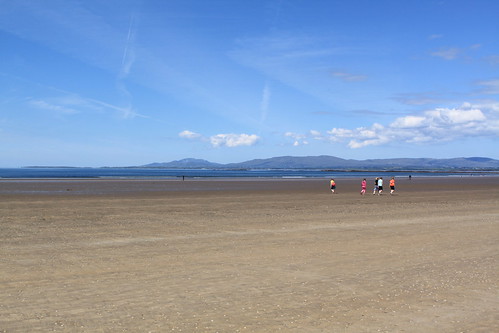Sermons, book reviews and randomness from the Reverend Garibaldi McFlurry.
Friday, June 29, 2012
Book Review: Forgotten God
Christians believe in the Trinitarian God - Father, Son and Holy Spirit. Yet according to Pastor Francis Chan, the Holy Spirit has been forgotten, a problem he addresses in his book Forgotten God. As he says: 'the Holy Spirit is tragically neglected and, for all practical purposes, forgotten. While no evangelical would deny His existence I'm willing to bet there are millions of churchgoers across America who cannot confidently say they have been experienced His presence of action in their lives over the past year. And many of them do not believe they can.' (p. 15)
As he surveys the contemporary scene, he asks the reader to imagine living on a desert island for twenty years, having only the Bible to read, becoming convinced of the important (even essential) part the Holy Spirit plays in the life of the believer. Then returning to the average church, and being disappointed at the lack of the Spirit's power and influence.
The solution, he maintains, is not 'seeking a "healthy balance" of the Holy Spirit', because he has 'yet to meet anyone with too much Holy Spirit.' (p. 20). Rather, 'when believers live in the power of the Spirit, the evidence in their lives is supernatural. The church cannot help but be different, and the world cannot help but notice.' (p. 17).
Chan continues to advance the book with helpful chapters addressing some attendant fears that people may encounter when they explore the Spirit. These include what others will think (in relation to our theological 'camp'), that God won't answer our prayers; or that God will answer our prayers, and take us where we don't want to go. As Chan acknowledges: 'The truth is that the Spirit of the living God is guaranteed to ask you to go somewhere or do something you wouldn't normally want or choose to do. The Spirit will lead you to the way of the cross... and that is definitely not a safe or pretty or comfortable place to be.' (p. 50)
This is an important point that I think is often missed by many as they think about the Holy Spirit - that the Spirit is not a separate entity, but is rather part of the Trinity, who together are working in our lives. The connection between the Spirit and the way of the cross was well made, as again later: 'The Spirit is meant to lead us toward holiness. The Spirit is here with us to accomplish God's purposes, not ours.' (p. 93)
I was slightly puzzled by the chapter exploring the Biblical survey of the Spirit's person and work, though. The starting point is in Acts, rather than the Old Testament (or even the Gospels), 'when the Spirit descended and began to indwell the disciples.' (p. 67). There doesn't appear to be an explanation for this starting point, so the reader may need to consult other books for a fuller biblical background (e.g. 'Knowing the Holy Spirit through the Old Testament' by Chris Wright).
As Chan continues to explore the impact of the Spirit on the life of the believer, he addresses a popular (and often misconceived) topic - that of God's will for my life, and the Spirit's guidance for the Christian. The problem with such thinking, so popularly expressed, is that 'it's safer to commit to following Him someday instead of this day.' (p. 120) Indeed, 'I think a lot of us need to forget about God's will for my life. God cares more about our response to His Spirit's leading today, in this moment, than about what we intend to do next year. In fact, the decisions we make next year will be profoundly affected by the degree to which we submit to the Spirit right now, in today's decisions.' (p. 120).
The book's aim is not primarily imparting knowledge, but rather it is sent forth with a powerful prayer: 'So while hopefully you will learn something new about the Holy Spirit in this book, my prayer is that it will draw you into deeper communion with the Spirit and greater experience of His power and presence in your life.' (p. 36). It appears that Chan's prayer will be answered, in this great little book.
I heartily recommend it, for any and every sort and type of Christian, to both learn more about the Holy Spirit, but more importantly, to walk with the Spirit and know His power in your walk. I managed to download this free from Amazon when the publisher made all Chan's books free on the Kindle store one day, but even for a couple of pounds it's well worth reading. Available from Amazon Kindle store and your local Christian bookshop.
Labels:
books,
Christianity,
Holy Spirit,
reading
Monday, June 25, 2012
Sermon Audio: Romans 8: 9-17

Yesterday morning in Aghavea I was preaching from Romans 8 at a very special Baptism, as we thought about adoption as a picture of the gospel, in that we become Children of God.
Labels:
Romans,
sermon audio
Sunday, June 24, 2012
Sermon: Romans 8: 9-17 Children of God

If you had just one word, how would you describe God? Would it be a word like ‘creator’? Perhaps you’d be more likely to use the word distant, or fearsome, or judge. You might even jump in with a completely different type of word - non-existent; or (if it was Richard Dawkins) delusion?
How you think about God, how you describe him, probably says a lot about what you think of him, but also, reveals your relationship to him. If we were able to take the time and go around the church, you might have lots of words. Would you come up with this one? Daddy, or dad.
That way of speaking might seem shocking; it may seem overly familiar; even presumptuous, yet that’s exactly what the Bible tells us is possible - to call God our dad. In another part of the Bible, John says this: ‘See what love the Father has given us, that we should be called children of God.’ (1 John 3:1). In the Bible reading we heard today, the apostle Paul expands on that thought, and shows us that we too can call God father or dad.
It doesn’t come naturally, though. It’s not something we can presume to do by ourselves. You see, as we follow our own way, as we ‘live according to the flesh’ (13), we are separated from God; cut off from relationship with him; we face the due penalty for our sins. We say no to God, we do whatever pleases us, but it leads in the end to death. Left to ourselves, this is the course that each one of us is following.
But the good news is that Jesus Christ, the Son of God, came from heaven to live and die on this earth. As he hung on the cross, he took the death that we deserved; dying in our place. If you’ve been watching the Euro 2012 matches, Jesus is like the substitute who comes on in place of another - he took our place.
A Christian is someone who has heard this good news, and believes it. They accept the substitution; they recognise that Jesus took their place, and they live for him. You see, Jesus didn’t stay dead - he was raised to life by the Holy Spirit. As we trust in Jesus, we are given the Holy Spirit to live in us, to give us life, and to help us to live for him.
If you’ve ever been on Facebook, you’ll have seen the personality quizzes - what type of person are you? Which star wars character are you? (or which Twilight character are you?) There are lots of possibilities. But according to Paul, there are only two types of people. Only two categories of people in the whole world - those who live according to the flesh; and those who live by the Spirit.
But what does it mean to live by the Spirit, to have the Holy Spirit in your life? In verse 14, Paul says: ‘For all who are led by the Spirit of God are children of God.’ To have the Holy Spirit is to be a child of God.
Our relationship to God has changed. At Primary School, one of our dinner ladies ruled the playground with an iron fist. Any mischief was quickly spotted and stopped. Her threats were enough: ‘“I’ll take you to the Master.” We were in fear of the principal. He was so much older and bigger and more fearsome (even if he wasn’t allowed to cane us - I’m not that old!). But is that how his children related to him at home? Not at all - he was their dad. They say him in a completely different light.
It’s the same with us and God - as we come to believe the good news, we receive the Spirit - not a spirit of slavery to fall back into fear, but we have received a spirit of adoption (or the Spirit of adoption). We who were on the outside have now been brought inside. We have been made to feel welcome, and been declared to be members of the family, at home with God.
It was with great joy that we heard of N’s adoption being declared - she is now at home with T and J; she has a new family. And because of that, things will never be the same again. She has new relationships, and a new inheritance.
You see, T and J are now legally and fully and finally dad and mum. It’s a cry they probably hear lots of times: Dad! Mum! and they scurry to see what’s happening, what N is up to!
It’s a picture of how each of us, as we believe in Jesus, are adopted into God’s family. When we’re in the family, we can call God ‘dad’. It’s the way that Jesus addresses God as he is praying in the Garden of Gethsemane (Mark 14:36). He was the only one who really could call God dad, yet the wonder of it all is that Jesus endured the cross to enable us to call God dad. When the disciples ask Jesus to teach them how to pray, what is it he tells them to say? ‘Our Father.’
‘When we cry Abba! Father! it is that very Spirit bearing witness with our spirit that we are children of God.’ The God who made the whole universe is not distant; instead, he is (or can be) your dad - the one who hears your cry, the one who confirms that you are his child by the presence of his Holy Spirit, helping us as we cry out in prayer.
As if all that wasn’t enough, there is still more. You see, if we are children of God, then that means that we are heirs of God. I don’t know if T and J have much of an inheritance to pass on - but some day it will all be N’s. As we become part of the family, we become not only children, but also heirs.
We are joint-heirs with Christ - all that he inherits and receives from the father will also be ours, we will share it with him. As Jesus takes his place on the throne and rules over the universe, so we will share with him in the new heavens and the new earth.
As we look forward to sharing in the inheritance, Paul reminds us of the pattern that Jesus followed, which also lies before us: ‘if, in fact, we suffer with him so that we may also be glorified with him.’ The suffering of Christ is finished - perfect; nothing can be added to his sacrifice to make us more acceptable to God; we are his children.
Yet we’re not home yet - we need to be putting to death the deeds of the body; fighting against our natural desires; saying no to temptation, in order to be led by the Spirit. We simply couldn’t do it on our own - but we’re not on our own! We’re in the family of God, given the Spirit of God who helps us, and enables us to call God our dad.
As we baptise N today, we call out to God on her behalf; we make promises for her, until she is of the age to make them for herself. It’s as if we’re writing a cheque, which one day she will have to cash in, to claim the promises of God for herself.
For the rest of us, the door is wide open; the invitation is there - come in to the family, make yourself at home. You too can be a forgiven, welcomed child of God. You too can call God your Abba Father, daddy.
Thursday, June 21, 2012
Book Review: Orthodoxy

You don't have to be on Facebook or Twitter for long to spot one of the many social networking trends, whether it's posed photos; inspirational quotes with picture included; soppy sentiments (I plead guilty for yesterday's reminder of our engagement anniversary); games; or quotations from books. One of the authors who always gets a mention is the English writer, GK Chesterton, most notably from his book Orthodoxy.
Having found it for free on the Amazon Kindle store, it was downloaded and read, although not necessarily completely understood. Chesterton sets out in Orthodoxy to 'attempt an explanation, not of whether the Christian faith can be believed, but of how he personally has come to believe it.' (p. 1) To some extent, it is autobiographical, yet at the same time, he is writing in opposition to some other key thinkers in his day, against their philosophies and theories. In a certain sense, it's like listening to someone on the phone, only really hearing one side of the conversation, and not grasping all that is going on. The intellectual challenges and issues are those of his own day and experience, the debate raging in the letters pages of the London Times and such other papers, against George Bernard Shaw and other controversialists.
Chesterton's wit is very obvious, with his turns of phrase and his self-deprecating humour. Early on he declares: 'For if this book is a joke it is a joke against me. I am the man who with the utmost daring discovered what had been discovered before.' (p. 6) He tells how his experience of life has confirmed each of the main doctrines of Christianity, having worked from philosophical premises, so that what he would expect is exactly how things actually are: 'Instinct after instinct was answered by doctrine after doctrine.' (p. 75)
He has little time for revisionists or innovators in theology: 'Certain new theologians dispute original sin, which is the only part of Christian theology which can really be proved.' (p. 10) Similarly, he declares: 'And though St John the Evangelist saw many strange monsters in his vision, he saw no creature so wild as one of his own commentators.' (p. 13) There are great appeals to tradition, such as this one: 'Tradition means giving votes to the most obscure of all classes, our ancestors. It is the democracy of the dead.' (p. 43)
As I've said, there were some parts I found difficult to grasp, partly because he was answering the accusations and challenges of others (in the most forthright of terms), and partly because he seemed to be using words I knew, but not in a way I could understand. one such is in his contrast between mysticism and reason; sanity and insanity.
The memorable phrases seem to roll off his pen: 'In so far as I am Man I am the chief of creatures. In so far as I am a man I am the chief of sinners.' (p. 90) 'We have said we must be fond of this world, even in order to change it. We now add that we must be fond of another world (real or imaginary) in order to have something to change it to.' (p. 102) 'In the upper world hell once rebelled against heaven. But in this world heaven is rebelling against hell.' (p. 107)
I'm not sure what my final opinion on Orthodoxy (the book!) really is. The special moments shine out like gems or stars, but there was a lot of other stuff to wade through to find them. While Chesterton was answering the questions his society (or particularly, some of the fashionable intellectuals) were asking, the questions have now changed, even if the answer remains the same. If you are wanting a challenge, then plunge in - the rewards are within - but the cost of finding them may just be too great. Having said that, the Kindle edition is free, so it'll not harm your pocket!
Labels:
apologetics,
books,
Christianity,
Kindle,
reading
Tuesday, June 19, 2012
Book Review: The Bookseller of Kabul

Growing up in Northern Ireland during the Troubles was, at one and the same time, both very strange and yet remarkably normal. While the outside world watched the TV news coverage of bombs and bullets, most people in Northern Ireland lived fairly ordinary lives, even while being subjected to tremendous pressures. What was normal seemed very stressful to those looking in - something we realised when a few of us were in London on the day of the 07/07 terrorist attacks of 2005 and coped without panic, while a Scottish friend was extremely stressed wanting to get home and away from the madness.
Beneath the headlines, though, are ordinary lives; births, marriages and deaths; work and rest and play; fallings out and makings up; news and gossip; hopes and dreams.
Afghanistan is one of those places that is never off the news. Famous or infamous because of the ongoing placement of British and American soldiers, and the rising death toll of the effort to bring peace and security to that war-torn land. Yet, just like Northern Ireland, within Afghanistan there are many ordinary families with their own fascinating stories. In The Bookseller of Kabul, Asne Seierstad tells just one family's story.
The Bookseller of Kabul is a wonderful portrait of life in Afghanistan, with Seierstad a masterful painter of sights and smells and scenes. The reader is transported to Kabul, and given access to the family of Sultan Khan, his two wives, his matriarchal mother, his children, brothers and sisters, and extended family. Having spent three months living with them, Seierstad tells plenty of stories, following the customs and rituals of proposal, engagement, and wedding - through negotiation between the families without the couple meeting or expressing an opinion.
There are insights into their hopes and fears; their loves and hates; their religious experiences; and what life was like during and after the reign of the Taliban. While there were some assertions I wouldn't necessarily agree with on Islam, it was interesting to hear what they make of it, and what it is like to go on pilgrimage, and what they hope to gain from it.
All in all, this was an enjoyable book, which you would particularly like if you've read either of Khaled Hosseini's books (The Kite Runner or A Thousand Splendid Suns). Well worth a read to experience another culture.
Tuesday, June 12, 2012
Roving at Rossnowlagh
Fermanagh is a lovely county, with some mountains, and lakes a plenty. One of the things I miss, though, is the beach. I'm not really a lie on the beach or build sandcastles type of person, but the beach can be a place for lots of fresh air and a good walk. We're now that little bit further from Portstewart Strand, and the north Down coastal path is out of the question these days. Our nearest beach is to be found across the border, at the destination of Orangemen on a Saturday in July - Rossnowlagh, County Donegal.
We've been for a walk there several times now, most recently on the Queen's Diamond Jubilee Bank Holiday Monday. It felt a bit strange to be celebrating her reign by leaving her realm, but at the same time it was a lovely day (when the sun shone unhidden by the clouds!). Despite the impression given by some of these photos, there was quite a crowd at the beach. Lots of cars were parked, ice cream vans were competing for trade, and there were plenty of dogs - as Pippa discovered to her cost when an overly friendly golden retriever came to say hello.
Here are a few pictures from the day:

This man was earnestly hunting for treasure. Don't think he found any.

The tide was well and truly out, giving us plenty of beach to play with.

I don't think this crab was sunbathing. He looked a bit crabbid, really.

The scenery is beautiful in this part of Donegal.

This might be the buoys brigade, marking off where it's unsafe for vehicles to journey across the softer sand.

The kite was flying high - until I tried to take some photos of it, and promptly crashed.

The lifeguard station was closed up. No Baywatch available that day - perhaps Pamela Anderson and David Hasselhoff were otherwise occupied.
We've been for a walk there several times now, most recently on the Queen's Diamond Jubilee Bank Holiday Monday. It felt a bit strange to be celebrating her reign by leaving her realm, but at the same time it was a lovely day (when the sun shone unhidden by the clouds!). Despite the impression given by some of these photos, there was quite a crowd at the beach. Lots of cars were parked, ice cream vans were competing for trade, and there were plenty of dogs - as Pippa discovered to her cost when an overly friendly golden retriever came to say hello.
Here are a few pictures from the day:

This man was earnestly hunting for treasure. Don't think he found any.

The tide was well and truly out, giving us plenty of beach to play with.

I don't think this crab was sunbathing. He looked a bit crabbid, really.

The scenery is beautiful in this part of Donegal.

This might be the buoys brigade, marking off where it's unsafe for vehicles to journey across the softer sand.

The kite was flying high - until I tried to take some photos of it, and promptly crashed.

The lifeguard station was closed up. No Baywatch available that day - perhaps Pamela Anderson and David Hasselhoff were otherwise occupied.
Monday, June 11, 2012
Sermon Audio: Ephesians 5: 21-33

On Sunday morning we were thinking about Love and Marriage from Ephesians 5. What will it look like for the husband to be the head of the household? Why would a wife submit to her husband? What is God's pattern for marriage?
Labels:
Ephesians,
marriage,
sermon audio,
wedding
Sunday, June 10, 2012
Sermon: Ephesians 5: 21-33 Love and Marriage

I have a confession to make. This might be the most difficult sermon to preach of my nine and a bit months here so far. You see, we’re looking today at marriage, and some of you might be sitting thinking to yourself - what does he know - he’s only been married for almost four years, compared to our twenty, thirty, fifty years together.
It would be much easier for me to skip this section and move on to something a bit easier to talk about - the armour of God in chapter 6. But let’s not get ahead of ourselves! You see, the sermon isn’t a chance for you to catch up on some sleep; but at the same time, it isn’t for me to stand up and rant on for fifteen minutes on a subject of my choosing.
We gather to hear God’s word read and proclaimed - it’s God setting the agenda, not me. It’s the reason we take books of the Bible and work through them from start to finish - right now, we’re working through Paul’s letter to the Ephesians, and marriage is the next topic he addresses. So you’re not just getting what I think of marriage - rather together we want to hear what God thinks of marriage, and what that will mean for our relationships.
The first thing to note is that God thinks marriage is a good idea. We saw that in our first reading from Genesis 2. God is the first matchmaker, forming Adam and then Eve, and bringing them together. Before the fall, before sin came into the world, marriage existed - one man, one woman, coming together to form one flesh, a permanent, public, life-long commitment.
When we were clearing out granny’s house, we came across old wedding photos. The black and white photos of granny and granda McMurray, looking radiant on their wedding day. It’s as if Paul pulls out the wedding picture of our first parents, Adam and Eve, and then he says that marriage itself - every marriage from Adam and Eve down to today - marriage is a like a signpost pointing towards the wedding banquet, the big wedding.
Not just the wedding of the year; not even the wedding of the century or millennium, but THE royal wedding. Look with me at verse 32. ‘This is a great mystery, and I am applying it to Christ and the church.’ Marriage has always been a signpost pointing to the great wedding feast in heaven when Christ and the church are united forever.
We’ve received a couple of wedding invitations for the summer - friends getting married. As they do that, it’s like the trailer for the film; a foretaste of the real thing. Their weddings will be like a picture of Jesus and the church. But so will their ongoing marriages. So many couples invest so much in their wedding day without really thinking about what comes next - the ongoing commitment in all the years that follow until death us do part.
So what will it mean for our marriages to point towards the union of Christ and his church? What should it look like if our marriage is a picture of Christ and the church? It’s like so many pictures (at least the ones I take) - so often it’s out of focus; it’s a bit blurry; it doesn’t really show it in all its glory. We need to focus again on the original, so that we can copy the pattern.
Firstly, Paul addresses the wives. ‘Wives, be subject to your husbands as you are to the Lord.’ In other versions the word used is submit - to ‘obey’ your husband. Now it might be that you immediately raise all sorts of objections; you might think that we’re just out to get you and control you; that it’s a power game; or that Paul hated women. But remember the pattern - ‘For the husband is head of the wife just as Christ is the head of the church, the body of which he is the Saviour.’
Christ is the head of the church - he leads it, and rules over it. In the same way, Paul says, the husband is to be the head in the household - not to dominate or to be a tyrant, but simply in order to provide a lead. (I remember hearing one woman say that her husband was the head of the household and then mutter under her breath that she was the neck that moved the head!).
It’s not easy to submit, but before the women start a revolution, let’s see what Paul says to the husbands. Now at first sight it might seem as if the men get off lightly - ‘husbands, love your wives.’ And the women might be thinking, well, is that it? We have to submit and they just have to love? But look at the standard of love they have to live up to. Remember again the pattern that our marriages follow, as they point to the royal wedding:
‘Husbands, love your wives, just as Christ loved the church and gave himself up for her.’ Now how did Christ love the church? Did he issue commands and demands all day and just be waited on hand and foot? Not at all - he came not to be served but to serve; he loved the church so much that he ‘gave himself up for her.’
Rather than men having it easy, they are called to die for their wives, to give themselves for her. To provide and nourish and tenderly care for her. It’s not that the husband’s will is there to be obeyed, no matter what the wife thinks. Rather, the husband is to pattern himself on the Lord Jesus, leading by serving and giving himself in love for his wife. Men, are you?
Wouldn’t it be so much easier to submit to a loving, giving serving type of husband? Just as the church submits to her loving, giving, serving (and saving) Lord. Marriage is another place for our salvation to be worked out; it’s one of the venues for practical Christianity - real life, and not just theory.
In so many marriages, the wife would never think of submitting because it wouldn’t be safe to - her husband would immediately take advantage. When two sinful and selfish people come together in marriage, there are going to be ructions - always trying to gain the upper hand and control the other. It’s like the out of focus photo - you might just be able to make out that it’s a bride and groom, but that’s about all. As Christians, though, doing marriage in the way Paul describes here; each giving themselves to the other; putting the other first; together looking outward to love and serve; in this marriage the focus on the camera is corrected, the picture becomes clearer, sharper - the picture of the union of Jesus and his bride the church. That royal wedding that will continue throughout eternity which will never come to an end.
For those in marriage, the application should be clear - how does your life together point to our salvation? Are there things you need to work on?
But for those who aren’t currently married, you might be thinking, well, that was a waste of coming to church. That wasn’t for me at all. But perhaps you’ll be married some day - how are you preparing even now, maybe even before you have met your husband or wife to be. Are you cultivating these habits of giving and serving; or just being selfish? Perhaps you give thanks for your own marriage which has finished - how can you be helping others in their marriage? Could you be praying for the young couples preparing for weddings? A listening ear for problems?
Married or not, each of us are invited to the great Royal wedding, not just as spectators, not even just as guests, but as part of the bride. The King has proposed, the wedding date is set. Our earthly marriages are pictures (albeit imperfect) of that great wedding. As we gather at the Lord’s table, we have the foretaste of the great feast. Will you accept? Will you say I do?
This sermon was preached in Aghavea Parish Church on Sunday 10th June 2012.
Thursday, June 07, 2012
Book Review: South: The Story of Shackleton's Last Expedition 1914-1917

The Kindle did it again! I've said before that books can transport you to places and experiences you would never otherwise encounter, and so it was with this free Kindle ebook, leading to a chilly read. Sir Ernest Shackleton was one of the great polar explorers, and this volume invites you to travel with him on his attempted expedition across Antarctica. As the world began to go to war in 1914, Shackleton and his dedicated band of adventurers were setting off to explore the Antarctic region, including a trek across the South Pole from one side to the other. This is the story of their journey.
From the outset, the reader is told that the expedition failed in its objective, but nevertheless 'there are chapters in this book of high adventure, strenuous days, lonely nights, unique experiences, and, above all, records of unflinching determination, supreme loyalty, and generous self-sacrifice on the part of my men.' (foreward). The reader is transported to the barren wilds of the South Pole and the whole polar region, with stories of football played on ice floes, long months of winter darkness, hunting for penguins and seals, dodging sharks and killer whales, low food stocks, and scary moments.
Early on, Shackleton's boat becomes stuck in the ice field, and the party have to set out on sledge and foot across the ice, not having made it to 'dry land' yet. Their bravery knows no bounds, in that terrible and desolate place; with courage and encouragement keeping their spirits high as they urge each other on through moments of thirst and hunger, as well as the sadness of losing the dog sled teams. The puniness of man compared to the wonders of Nature were felt: 'We had seen God in His splendours, heard the text that Nature renders. We had reached the naked soul of man.' (p. 115)
There were some insights into Shackleton's sense of responsibility and thoughts on leadership:
'I confess that I felt the burden of responsibility sit heavily on my shoulders; but on the other hand, I was stimulated and cheered by the attitude of the men. Loneliness is the penalty of leadership, but the man who has to make the decisions is assisted greatly if he feels that there is no uncertainty in the minds of those who follow him, and that his orders will be carried out confidently and in expectation of success.' (p. 68)
At the same time, there was a quiet confidence in the Providence of the Almighty God: 'When I look back at those days I have no doubt that Providence guided us, not only across those snowfields, but across the storm-white sea... I know that during that long and racking march of thirty-six hours over the unnamed mountains and glaciers of South Georgia it seemed to me often that we were four, not three.'
That crossing had been when Shackleton took two of the party with him in an attempt to bring help from the whaling station at South Georgia, having crossed the sea in a little boat entirely unsuited to such a journey. The lieutenant left in charge of the remaining men on the ice had an infectious leadership style, brimming with confidence that spilled over into his companions:
'Wild reckoned that help would come in August, and every morning he had packed his kit, in cheerful anticipation that proved infectious, as I have no doubt it was meant to be... "You see, boss, Wild never gave up hope, and whenever the sea was at all clear of ice he rolled up his sleeping bag and said to all hands, 'Roll up your sleeping bags boys; the boss may come today." Talk about an illustration for an eschatalogical hope!
This was a fascinating read, both chilling and yet inspiring. Chilling, because with the constant depiction of ice and snow and temperature of 0 degrees Farenheit (let alone Celsius!), it makes the reader a little cold, even in the heat. Inspiring, because of the leadership provided by Shackleton and the willingness of the men to serve and help and encourage each other. All in all, it was a remarkable journey, even if unsuccessful, and well worth reading for the bargain price of £0.00! South can be downloaded from Amazon for the Kindle.
Labels:
books,
history,
Kindle,
leadership,
reading
Wednesday, June 06, 2012
Sermon Audio: 1 Chronicles 29: 1-20

On Sunday morning I was preaching from 1 Chronicles 29 on the great Gift Day for the Jerusalem temple, as David and the people freely gave their gifts towards the building project. Behind all our gifts is God the Gracious Giver.
Labels:
1 Chronicles,
sermon audio
Sunday, June 03, 2012
Sermon: 1 Chronicles 29: 1-20
It’s a momentous day in the nation’s history. An important time in the life of the country. It has been anticipated for so long; preparations have been made. Crowds have gathered in the capital for a great celebration. It’s a day that will never be forgotten.
You might think I’m talking about the Diamond Jubilee of Her Majesty, Queen Elizabeth, this very weekend. It’s right and proper to celebrate her long reign over us, and to give thanks to God for his faithfulness for sixty years of the Queen ruling. But I’m actually thinking about the circumstances surrounding our first reading, from 1 Chronicles.
It’s a book you might not be so familiar with, coming near the end of the Old Testament history section. 1 & 2 Chronicles are a history lesson for the exiles returning from Babylon to rebuild Jerusalem. The two books tell the story of how they got into the mess in the first place - how the kingdom of Israel was established, how promising everything looked, and how it all withered and fell away, starting with the reign of Solomon and the other kings.
Our reading, though, comes at the end of David’s life and reign. David has been king for forty years, finally in the city of Jerusalem. He lives in a palace, but the ark of the covenant (the symbol of God’s presence among his people) still stays in the tabernacle - the tent it travelled through the wilderness with the children of Israel after they came out of Egypt and journeyed to the promised land.
David wanted to build the temple - the stone building where Gods presence would rest in the heart of the city - but God said no, that Solomon would build it. So David has made the plans, the directions for building the temple are completed, and David gathers the whole nation together for a Gift Day.
It might be useful to have the chapter open in front of you, to follow the action. Firstly, David gives his gift to the temple: gold, silver, bronze, iron, wood, onyx and precious stones, and marble. The King takes the lead in giving such treasure to the work of the Lord’s house. He’s not like a back seat driver, telling others how to do it but not doing it himself - he takes the lead, he shows that he is in control of his money (not the other way round!), and so he shows his wallet who is boss.
It’s then that he can issue the challenge, as he asks the people of God: ‘Who then will offer willingly, consecrating themselves today to the Lord?’ (5) It’s not a compulsory thing; it’s an invitation, to willingly offer gifts to the Lord. The people respond in generosity, with more gold, silver, bronze, and iron, and precious stones.
Do you see their reaction in verse 9? ‘Then the people rejoiced because these had given willingly, for with single mind they had offered freely to the LORD; King David also rejoiced greatly.’ There is joy as we give to the Lord’s work, it leads to rejoicing. Let’s hope that it is with joy that we also come to give our offering this Gift Day.
You see, we’re still giving to the work of the Lord, to the building of the temple. There is now no physical temple, no building we can point to as our temple. The temple is being built in us and all around us - just as we’ve been learning from Paul’s letter to the Ephesians: ‘So then you are no longer strangers and aliens, but you are citizens with the saints and also members of the household of God, built upon the foundation of the apostles and prophets, with Christ Jesus himself as the cornerstone. In him the whole structure is joined together and grows into a holy temple in the Lord; in whom you also are built together spiritually into a dwelling-place for God.’ (Eph 2:19-22)
Occasionally on my travels, I come across a church where there’s some renovations happening. Several months ago, I had discovered Boho church (Bo ho as I thought), where they were building an extension. At the gate, there was the warning sign showing the need for a hard hat, because the place was a building site. In a sense, every church needs a sign like that, reminding us that we’re still a work in progress, there’s more to be done, we’re in the building trade, building the Lord’s dwelling, the Lord’s temple.
Our gifts today will go towards the building work of the Lord. May they be offered willingly and cause rejoicing, as we see progress in the Lord’s work.
The thing about Gift Days, though, is that we can become fixated with the amount raised - whether it’s more than last year; whether it’s enough. Just in case we’re tempted to fall into that way of thinking, David helps us get our focus back to where it really matters - not on the gift, but on the gracious giver of all gifts. He does this by his powerful prayer, using some words that might just be familiar: ‘Yours, O LORD, are the greatness, the power, the glory, the victory and the majesty; for all that is in the heavens and on the earth is yours... For all things come from you, and of your own have we given you.’
It’s not that we’re so great or good or generous. Rather, David celebrates that God owns all things, and graciously gives us everything that we have. So whatever we have already belongs to God - we are just stewards of it - so it’s only right that we use it to honour God, and give to him.
It’s a bit like the boy who can buy mummy a birthday present because mummy has already given him his pocket money. We can only give because God has first given to us. It’s the very essence of grace - God gives us what we don’t deserve; it calls for us to willingly respond with praise and thanksgiving.
You see, David’s gift that day wasn’t his way of saying “right God, I’ve bought your favour now, you’ll have to do what I want.” We can’t buy God; we can’t pay our way to heaven. Instead, the God of grace makes the first move. He gives us life and strength and every good gift. He sent the Lord Jesus into the world to die for our sins on the cross, to clear the way to welcome us home, to bring us into his cosmic temple building project. He gives us the gift of faith to receive his promises and believe them.
The giver of all things doesn’t need our money; but he graciously invites us to give to his work. The Lord of all wants us to respond with joy, by giving not just our money, but by giving up our lives as living sacrifices, giving all of us for his work, for his praise and glory.
It was an important day in the nation’s history. David and the people celebrated the gifts given that day to build the Jerusalem temple. During Solomon’s reign, the temple was built, and people came to hear the wisdom of Jerusalem’s King. Eventually, though, that temple was destroyed by Nebuchadnezzar. The returning exiles tried again, but with less success.
The temple of the Lord is being built here and now, and across the world, as men and women, boys and girls hear the good news about Jesus and are added to the temple, the Lord’s dwelling. This temple will never be destroyed. You’re invited to be part of this great building project - will you receive God’s grace, and then give your all? Thanks be to God for his indescribable gift!
This sermon was preached in Aghavea Parish Church on the parish's Gift Day, on 3rd June 2012.
Labels:
1 Chronicles,
grace,
sermons,
thanksgiving
Subscribe to:
Posts (Atom)

